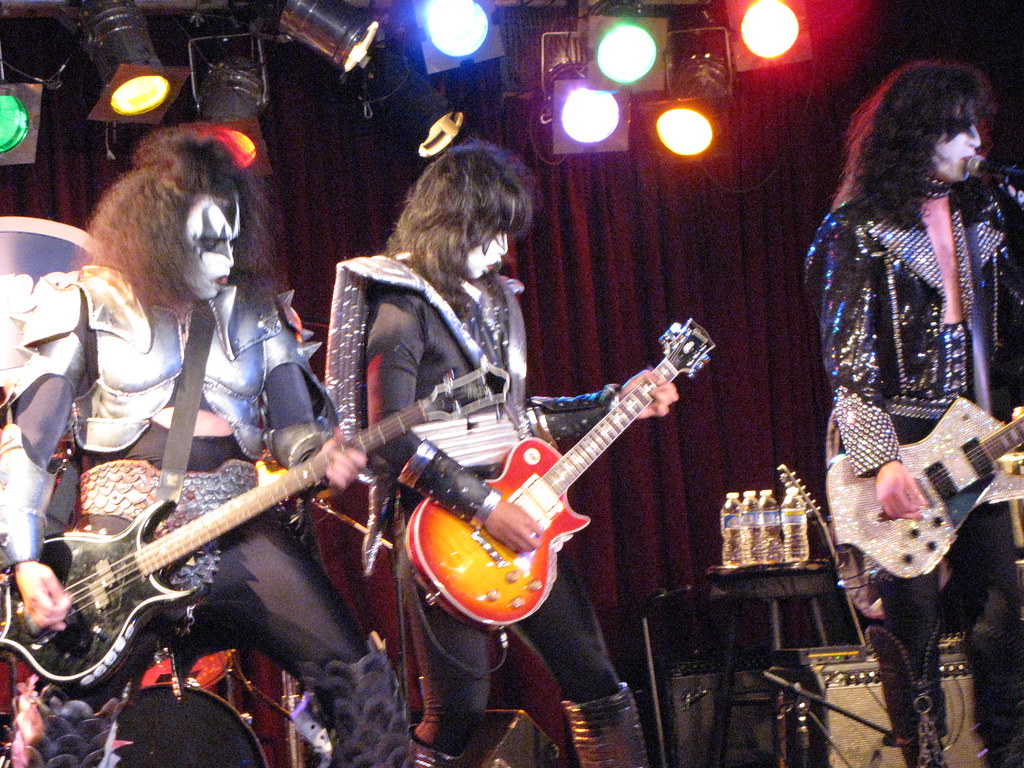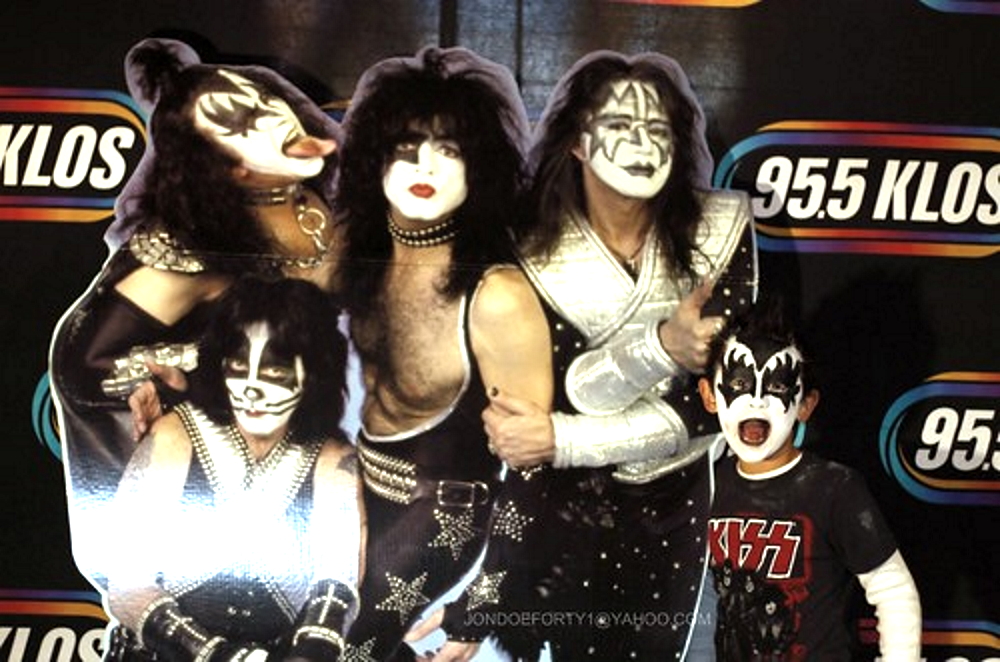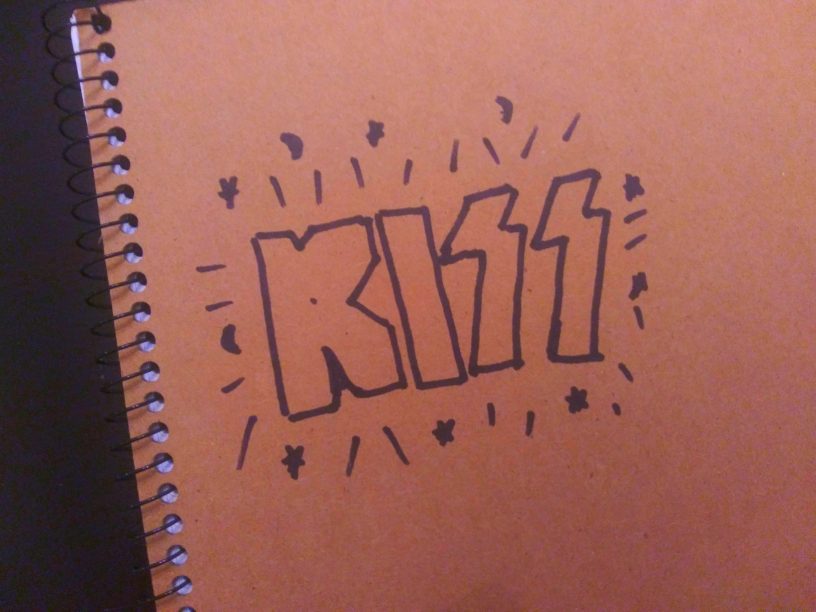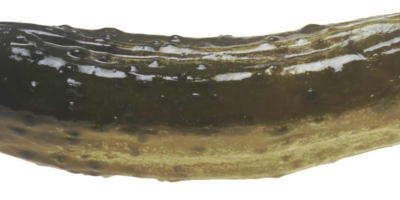At some point—nay, many points—in his band’s performance at Rupp Arena on Thursday evening, bassist and noted litigious bastard Gene Simmons will open his mouth and unfurl his tongue like a snail emerging from its wrinkled, septuagenarian shell, while wielding his instrument like a four-foot phallus, pointing the business end at audience members all around the venue without first asking for their explicit verbal consent. In response, beer-bellied men with sketchy facial hair will grunt, raise a fist, and bellow “yeeeeaaaaahhh!” Likewise, leathery women with stained blue jeans will holler “wooooooooo” and lift the hems of their tee-shirts to their necks, revealing their lack of topside undergarments.
At least, that’s what I imagine will happen. I really don’t know. I’ve never been to a Kiss concert. Because I hate Kiss. Kiss sucks. Their lyrics read like they were written by a hormonal 13-year-old boy, and the music sounds like it was composed by his special-needs younger brother. And I’ve always felt this way, even when I was a hormonal 13-year-old boy.
See, youngsters, in the decades of the 1970s and 1980s, there were two kinds of juvenile wannabe rockers: there were the smart, literate kids, who read Tolkien and pondered the existence of absolute good and evil, and who therefore fell into Led Zeppelin and Black Sabbath, respectively, and then there were the ne’er-do-wells, who took up smoking at 11 and sniffed amyl nitrate between classes. They dug Kiss. The first group went to college, learned about obscure wine varieties, and became functioning adults. The second got jobs with the city, drank 24-ounce Black Labels, and never stopped rockin’, brother.

The thing is, though, that society needs the youth wing of the Kiss Army. It needs the kids who spend all day scrawling Kiss logos on their notebooks while the teacher drones on about nouns and verbs and you know, words generally. It needs them because they listen to Kiss, and then they ask their parents to buy them guitars, and their parents agree because at least if their kids are locked in their bedrooms learning “Christeen Sixteen,” then they aren’t huffing paint in the woods with who-knows-who.
And so we need Kiss as well, for the important societal function they serve. Our jails are overcrowded now, but how much worse the problem if Kiss never existed? Countless are the children that band has saved from ruin. There is salvation in power chords, surely, though they be overly loud, imperfectly intonated, and only three in number.
Some of the kids even get pretty darn good at it. In fact for decades, Kiss provided the syllabus for Rock 101. Grinding your way through the tablature to Zep’s “Over the Hills and Far Away” is the path to tedium and disillusionment, but you can find enlightenment in about 10 minutes if you “Shout it Out Loud.” Like their fellow New Yorkers and contemporaries The Ramones, Kiss churned out albums full of accessible, hooky anthems seemingly designed for the beginning guitarist. You could start with “Plaster Caster,” work your way up to “Strutter,” and by that point, it was time to form a band, man.
The list of acclaimed musicians inspired by Kiss is long and impressive. Dave Grohl, of the Foo Fighters and an earlier band, claims “Destroyer” revealed his life’s calling. Legendary progressive rock and metal drummer Mike Portnoy calls them “heroes.” Tom Morello, in his speech inducting Kiss into the Rock & Roll Hall of Fame, named them as “the band that made me and millions of others love rock and roll.” Around the same occasion, Esquire magazine even compiled an exhaustive catalog of notable rockers who publicly acknowledged their debt to face-painted quartet.

The problem is, nearly everyone on that list is on the northern side of 50. Those kids who saved up to buy “Love Gun” in 1977 now likely need a little pharmaceutical help in loading theirs. Worse, as Kiss finally calls it a day, it isn’t clear that any band—any rock band—has the power and influence to replace them. The end of Kiss seems to be to some extent the end of rock itself, at least as a dominant musical genre. Take a look at the Billboard charts: nary a power chord in sight, unless sampled, chopped, and included ironically in a mindless EDM loop.
Some say that’s a good thing, that the hegemony of the tube-screamed six-string needed to end, and perhaps that the rock form will be better for it, returned to its garage roots. Others might point out that the kids are still locked in their bedrooms, only now they’re programming beats in Ableton instead of thumbing through chord books.
But the spirit of rock is collaborative, not solitary: Eddie Van Halen spent his teenage years in seclusion in order to one day join forces with kindred spirits and spread his gospel among the masses, not to upload ever more content to Soundcloud. And rock is rebellious; it’s meant to be loud, ugly, and rough around the edges. My own parents hated my taste for punk and metal because they found it abrasive and unsettling. In my own middle-age, I mostly find the hits of today quite boring, not upsetting. Finally, real instruments are difficult, and frankly, electronic sequencing is not. Learning guitar, bass, or drums challenges both the mind and body, and with the struggle comes the feelings of growth and accomplishment. Does the act of clicking and dragging a pre-packaged MIDI pattern into a GarageBand track feel like triumph? Does it really?
Kiss sucks. Kiss is (almost) dead. But long live Kiss, not for the music they released, but for what they were, for what they meant. I don’t like them—never have—but isn’t the world a better place for them having been in it?
Kiss plays Rupp Arena at 7:30 P.M. on February 13. David Lee Roth opens. Tickets at rupparena.com, ticketmaster.com, and kissonline.com.



Michael Benton
Correct me if I am wrong, weren’t some of the members high school English teachers when they started the band?
Buck Edwards
I read on Wikipedia that Gene Simmons spent a few months teaching 6th grade. That seems inappropriate. The rest of them, I assume, were barbacks at seedy taverns on Staten Island.